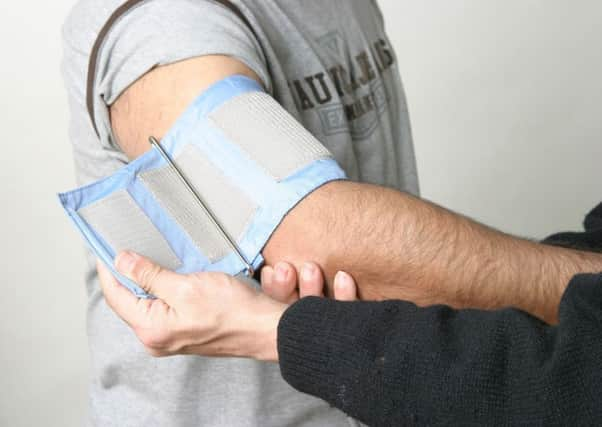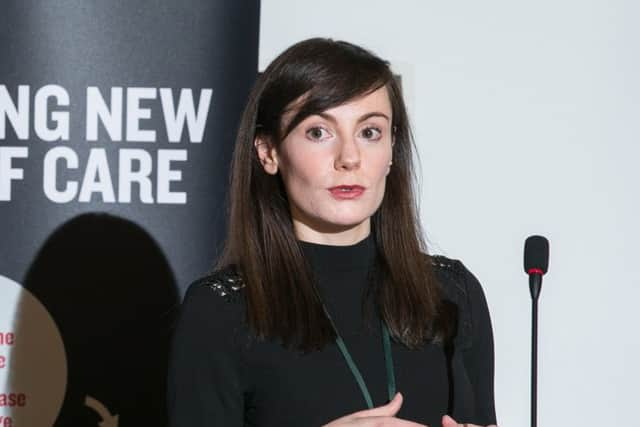Kylie Strachan: Early detection and close control of ‘the silent killer’ could save lives – and money


We know that high blood pressure is implicated in half of all strokes and heart attacks and it also increases the risk of heart failure, chronic kidney disease and dementia.
Worryingly, despite its potentially serious outcomes, high blood pressure does not usually have any symptoms so people may not realise that they have it. This is why it is often referred to as ‘the silent killer’.
Advertisement
Hide AdAdvertisement
Hide AdBlood pressure is the pressure of blood in your arteries, the vessels that carry blood from your heart to the rest of your body. High blood pressure, also known as hypertension, is when the pressure of the blood in the arteries is consistently measuring higher than the recommended level, usually 140/90mmHg.


Your blood pressure can be reduced through lifestyle changes, including stopping smoking, losing weight, increasing physical activity, and reducing salt and alcohol consumption. If this does not reduce blood pressure enough, medication can be prescribed to control it.
When we consider that 30 per cent of Scots adults have high blood pressure, and that less than a third of those people have their blood pressure treated and controlled to recommended levels, it is obvious that any serious attempt to reduce heart and circulatory diseases must address the challenge of high blood pressure.
Throughout 2018, British Heart Foundation (BHF) Scotland was involved in an inquiry by the Scottish Parliament’s Cross-Party Group on Heart Disease and Stroke. This inquiry consulted both with people living with the condition and healthcare professionals, to explore what is required to tackle high blood pressure in Scotland.
The resulting report Beating High Blood Pressure: Scotland’s Silent Killer states that a coordinated effort to better prevent and detect high blood pressure, optimise its treatment, and encourage supported self-management of the condition is needed. To achieve this, the report calls for a High Blood Pressure Task Force to address the key issues.
We can learn from countries like Canada, which is considered to be one of the world leaders in this area. Since a coordinated approach to tackling high blood pressure was adopted in Canada in the late 1990s, there have been improvements in the diagnosis, management and control of high blood pressure, together with a decline in death rates from related conditions like heart failure, heart attack and stroke.
Improving blood pressure control across Scotland is a complex undertaking and a Task Force would provide a crucial central point to collate evidence and knowledge, share good practice and drive forward change.
Part of the challenge to be tackled by a Task Force is in increasing detection of high blood pressure. This requires innovative thinking due to the condition’s lack of symptoms. The inquiry identified that measurement of blood pressure in community settings like gyms, community centres or libraries, for example, could improve detection rates and could be a useful way to reach out to people who are otherwise unlikely to have their blood pressure measured.
Advertisement
Hide AdAdvertisement
Hide AdThe BHF is currently investing £1.5 million pounds in 15 projects across the UK to test community-based approaches to blood pressure testing, including one in Scotland which is highlighted in the report.
However, early detection is only part of the challenge. Many people who have been diagnosed with high blood pressure do not have their blood pressure controlled to less than 140/90mmHg. It is estimated that optimally treating adults diagnosed with high blood pressure in Scotland could avoid nearly 300 strokes and 200 heart attacks every year.
Key issues related to blood pressure treatment and control include the need to improve the number of people taking their blood pressure medication as prescribed, to ensure that healthcare professionals have the information and training that they need to support people with the condition, and also to encourage the use of supported self-management of the condition. A case study in the report highlights the potential for telemonitoring, where a person monitors their own blood pressure at home using a validated monitor with electronic transmission of data to a healthcare professional, supporting individuals to manage their own blood pressure more easily and conveniently.
The report highlights much innovation and good practice with regard to blood pressure detection and management in Scotland. What is required now is the political will to bring together the relevant partners to drive forward this innovation, and tackle some of the complex issues that remain a barrier to better blood pressure levels across Scotland.
Now would be an ideal moment to create such a group, making the most of the discussions that were invigorated by the inquiry, and the progress in service delivery and technology that could radically reshape blood pressure detection and management. We know that such a commitment can have powerful impacts on the health of a nation, and could bring about improvements which could save and improve the lives of thousands of people in Scotland.
Kylie Strachan, Senior Policy & Public Affairs Officer, BHF Scotland